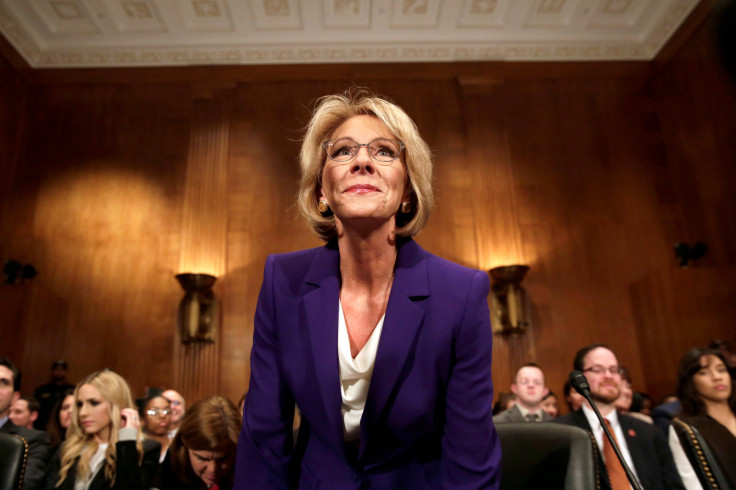Education Issues In America: Betsy DeVos To Face College Debt, School Choice And Other Challenges As Secretary

Now that the U.S. Senate has confirmed Betsy DeVos as education secretary, she'll now be tasked with leading the nation's school systems. A wealthy donor to the Republican Party from Michigan who has long advocated for more educational choices through charter schools and vouchers, DeVos faces a number of challenges in her new job.
DeVos will replace John King, who told Politico after leaving office that he was “disappointed” that DeVos hasn't shown a commitment to public education since being tapped by President Donald Trump for the position. Neither DeVos nor any of her children ever attended public school, while DeVos dedicated much of her life to supporting programs that encouraged students to use taxpayer dollars to pay tuition for private schools.
Here are some benchmarks and issues from the education system DeVos will soon lead:
Congratulations to our new Education Secretary, @BetsyDeVos! pic.twitter.com/w7jE6G2x0p
— President Trump 45 Archived (@POTUS45) February 7, 2017
High School Graduation Rates
Roughly 82 percent of high school seniors in the U.S. graduated at the conclusion of their 2013-14 school year, which was the highest graduated rate ever recorded, according to data from the Department of Education. This school year, 3.5 million students are expected to graduate from high school — 3.2 million from public high schools and 0.3 million from private ones.
Republicans and school choice advocates see DeVos’ stance towards charter schools as a way for children in urban areas to have a chance of pursuing a better education instead of having to go to their designated public schools. Public high schools in urban areas have struggled with poor standardized test scores, high teacher turnover rates and lagging graduation rates. The average high school graduation rate in the nation’s 50 largest cities was 53 percent, compared to 71 percent among students in the suburbs, according to a 2009 New York Times article.
School Choice
DeVos will be charged with applying Trump’s campaign pledge to turn $20 billion of government education spending into a federal voucher program providing students with the monetary ability to choose whichever school they want to attend. Though the DeVos family was a strong financial supporter of their local Grand Rapids Public Schools district in Michigan, about 39 percent of Grand Rapids students were not enrolled in public schools in their home district.
Roughly 50.4 students between Kindergarten and twelfth grade attended public schools in the U.S. in 2016, while 10 percent of students went to private ones.
Common Core
Common Core, a set of national education guidelines, was established in 2009. But the newest version of the Elementary and Secondary Education Act, the recently passed Every Student Succeeds Act, prevents the federal government from getting involved with states' standards, Vox reported. DeVos has spoken out against Common Core — and Trump vowed during his campaign to "get rid of" it and "keep education local" — but it doesn't fall under her purview.
College Readiness
Data from the National Assessment of Educational Progress has shown fluctuations over the past few years in students' readiness skills. In 2013, 39 percent of high school seniors were considered to be prepared for college math while 38 percent were considered to be ready for college-level reading. But in 2015, researchers found that only 37 percent of the students were prepared for collegiate work in each subject, the New York Times reported.
International Standing
In the 2012 results of PISA, an international test in math, science and reading administered in 65 different nations, American students scored below 29 other countries for math, falling from when it was in 23rd place in 2009. In reading, where U.S. students performed their best, Americans scored behind 19 countries — a dramatic departure from 2009, when it was ranked ninth, according to EdSource.
College Debt
Roughly 44.2 million Americans have student loan debt, in part due to climbing college costs: The average cost of a public four-year college for in-state students in 2016 was $9,410, while the tuition for a four-year private college was $32,410, according to a report from the College Board.
DeVos has criticized the rising cost of college and praised alternative paths to higher education like career training programs aside from traditional brick and mortar four-year-schools.
© Copyright IBTimes 2025. All rights reserved.






















